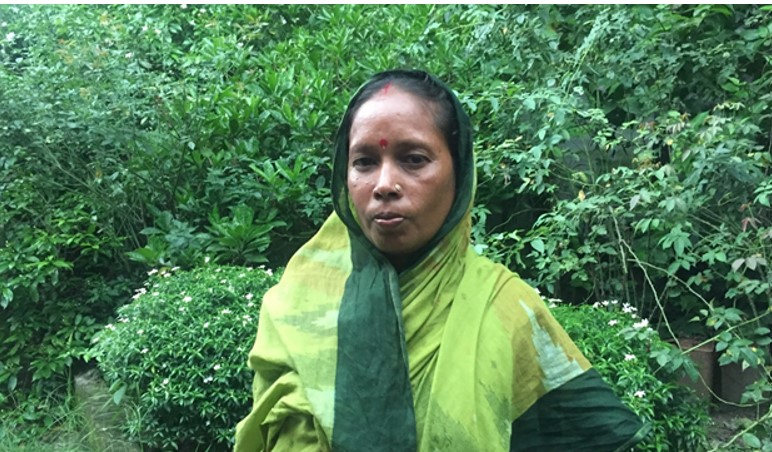Give back our land
The heavy monsoon rain is about to lash down on the small Radha Govinda Hindu temple in the Hajra Natore village just outside Natore town in Rajshahi. The tiny woman Rina Rani Shing is standing in front of the temple. She gathers her sari tighter around her as the thunder rolls closer.
Rina Rani Shing is 40 years old and mother of four children, the oldest 26 years. Rina and her husband Korun Shingh who belong to a small indigenous group Oraon (follow Hinduism as religion) are farmers and musicians.
Along with other 15 indigenous Oraon families, Rina’s family have been living on their land in Hajra Natore since their great grandfather’s time. Later they got a temporary settlement from the government. In 1968, Baidyanath Chakraborty, one of their neighbours moved to India and exchanged land with Bazlur Rashid’s father Emaj Uddin, who moved Bangladesh from Murshidabad, India. Later Bazlur Rashid constantly claimed that the land where Rina and other 15 indigenous Oraon families were living belonged to his father and with the assistance of corrupt officials grabbed their land with duplicate papers.
The land grabbers forced the indigenous Oraon families out from their land by destroying their houses and by threatening them not to go back to their ancestral land. Rina explains how the attackers threatened to bring her and the family to the police for occupying land belonging to someone else. The thugs were brutal, not even sparing their youngest daughter at only 13 years, who still suffered from pain in her chest.
Korun Shing, standing next to his wife, has tears in his eyes as he tells how he can no longer perform his art and earn money for his family. He said, ‘the attackers destroyed all of my musical instruments.’
The thugs are paid by powerful business people and they have fabricated false titles for the land.
In January 2018, Shamsur Rahman Sharif, the honourable Land Minister, claimed in the Parliament that the current amount of the total khas land in Bangladesh is nearly 4.1 million acres of which 2 million acres are agricultural land. And the rest of the khas land is non-agricultural land. Right now there are 3 million indigenous peoples who used to live in their ancestral land and formally it is known to be khas land. According to the Ministry of Culture Affairs there are 50 small ethnic groups (which meant to be indigenous peoples) in Bangladesh and Oraon is one of them mostly living in North Bengal.
Rina and her family belong to the 24 % of the population in Bangladesh living below the poverty line. According to government statistics, 36.89% of the rural households in Bangladesh are landless[1], the majority of these are indigenous people. They are among the poorest and most marginalized in Bangladesh in terms of access to land and rights to land. Their political influence is close to nil.
Association for Land Reform and Development (ALRD) works for the rights to land and natural resources for the indigenous peoples, fringe farmers and landless in Bangladesh. ALRD and its partners are fighting for existing land laws to be respected, and hold local and national authorities to account.
The distressed family brought their case to the authorities in Natore by help of Adivasi Samaj Unnayan Sangstha (ASUS) (Indigenous Peoples’ Social Development Organisation), a networking partner of ALRD. ASUS activists organized demonstrations, which was covered directly by all TV Channels including Ekushey TV, Channel 24 bringing it to the attention of the District Commissioner, who contacted Rina and Korun asking them what they wanted. The national dailies also cover the news.
The District Commissioner offered Rina and Korun to stay in a school, until the matter was resolved. But Rina and Korin stayed firm; “No, please give back our own land. If you cannot do that, then let the firing squad kill us!”
The District Commissioner reacted swiftly and ordered the land grabbers to leave immediately. When Rina’s family returned, they found their land fenced, and the house and all their belongings destroyed. Rina, Korun and their children had to spend the following nights under open sky, while struggling to repair their house.
Rina explains softly: “We are still in trauma and too afraid to sleep at night. We wake up at the smallest sound fearing the thugs coming back to attack us! Our life has become unbearable. We lost everything we had. We are in misery.”
With the help of ALRD and ASUS, the family filed a law case against the thugs and the man behind them. The court system in Bangladesh is slow, but Rina and her family stay hopeful to win the case and get their documents in order.
ALRD and its local partners, supported by Bread for the World (BftW) and Danida, support indigenous groups like the Oraon to claim their rights and for families like Rina’s to regain their land.





